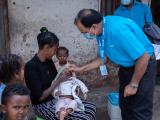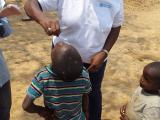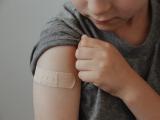Mar 5, 2010
WHO targets African countries with polio vaccine campaign
The World Health Organization (WHO) announced yesterday it will launch a polio vaccine campaign tomorrow aimed at reaching 85 million children under age 5 in 19 countries across West and Central Africa. The campaign's goal is to stop a year-long polio epidemic, and the first doses will go to nine countries that have had polio cases within the last 6 months: Burkina Faso, Cameroon, Chad, Guinea, Liberia, Mali, Mauritania, Senegal, and Sierra Leone. The WHO projects that more than 400,000 volunteers and healthcare workers will assist with the campaign, which it say is largely made possible with $30 million from Rotary International. A 2009 vaccine push did not block the polio outbreak, and officials say too few children were vaccinated to stop disease transmission. Some countries that haven't had outbreaks in several years had problems responding to polio cases. The WHO said improvements in this year's campaign include better monitoring of which children receive the vaccine and beefed-up staff coverage and training. Officials will repeat the campaign in the same 19 countries starting on Apr 24, and in the meantime children in six countries reporting the most recent cases will receive another dose on Mar 26 as part of a new short-interval dosing strategy to more rapidly build population immunity.
Mar 4 WHO press release
Lawmaker seeks congressional review of anthrax investigation
US Rep. Rush Holt, D-N.J., this week called for a congressional review of the FBI's investigation into the anthrax letter attacks of 2001, which killed five people and sickened 17 others. The FBI formally closed its investigation on Feb 19, after concluding that Army scientist Dr. Bruce Ivins, who committed suicide in 2008, perpetrated the attacks. Holt, who represents the district where the anthrax letters were mailed, said several important questions about the FBI's handling of the case persist, including whether the FBI's assertions about Ivins's behavior are accurate and whether its explanation of the presence of silica in the anthrax spores is scientifically valid. He also said it's not clear whether federal agencies have taken steps to prevent or mitigate future bioterror attacks. Holt called for the investigation in a letter to the chairs of the House committees on Homeland Security, Judiciary, Intelligence, and Oversight and Government Reform. Holt's press release said he succeeded in including a clause in the 2010 Intelligence Authorization Bill that would require the inspector general for federal intelligence agencies to examine the possibility of a foreign role in the anthrax attacks. Lawmakers previously asked the National Academy of Sciences to review the scientific methods the FBI used to trace the anthrax strain found in the mailings and samples from Ivins's lab.
Mar 3 Holt news release and letter
Cleansing of anthrax-contaminated building to cost $70,000
The decontamination of a building at the University of New Hampshire where a woman contracted gastrointestinal anthrax will cost $70,000, according to Foster's Daily Democrat, a news paper in Dover, N.H. The United Campus Ministry building in Durham is about to sign a $70,000 remediation contract with CYN Environmental Services of Stoughton, Mass., the Rev. Larry Brickner-Wood, the ministry's chaplain and executive director, told the newspaper. The cleanup will involve using a "bleach-like solution" to soak five rooms and a hallway where anthrax spores were found. Brickner-Wood said many items will be destroyed in the cleanup process, including furniture, art, books, a piano, and other musical instruments. Meanwhile, the woman who had the infection continues to improve, the story said. She is believed to have swallowed anthrax spores from an African drum during a drum circle event in December.
Mar 3 Foster's Daily Democrat story




















